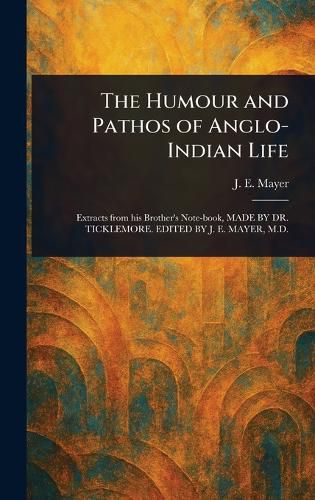Readings Newsletter
Become a Readings Member to make your shopping experience even easier.
Sign in or sign up for free!
You’re not far away from qualifying for FREE standard shipping within Australia
You’ve qualified for FREE standard shipping within Australia
The cart is loading…






This title is printed to order. This book may have been self-published. If so, we cannot guarantee the quality of the content. In the main most books will have gone through the editing process however some may not. We therefore suggest that you be aware of this before ordering this book. If in doubt check either the author or publisher’s details as we are unable to accept any returns unless they are faulty. Please contact us if you have any questions.
"The Humour and Pathos of Anglo-Indian Life: Extracts from his brothers note-book." offers a fascinating glimpse into British India and the unique social world of Anglo-Indian life. Authored by Dr. Ticklemore, this collection provides anecdotal observations and insights into the customs, traditions, and everyday experiences of the British in India. Delving into the nuances of colonial society, the book explores both the humorous and poignant aspects of life during this era. Through meticulously preserved extracts, readers gain a valuable perspective on the historical interactions between British culture and the rich tapestry of Indian society. A compelling read for anyone interested in the history of India, colonialism, and the social dynamics of a bygone era.
This work has been selected by scholars as being culturally important, and is part of the knowledge base of civilization as we know it.
This work is in the public domain in the United States of America, and possibly other nations. Within the United States, you may freely copy and distribute this work, as no entity (individual or corporate) has a copyright on the body of the work.
Scholars believe, and we concur, that this work is important enough to be preserved, reproduced, and made generally available to the public. We appreciate your support of the preservation process, and thank you for being an important part of keeping this knowledge alive and relevant.
$9.00 standard shipping within Australia
FREE standard shipping within Australia for orders over $100.00
Express & International shipping calculated at checkout
This title is printed to order. This book may have been self-published. If so, we cannot guarantee the quality of the content. In the main most books will have gone through the editing process however some may not. We therefore suggest that you be aware of this before ordering this book. If in doubt check either the author or publisher’s details as we are unable to accept any returns unless they are faulty. Please contact us if you have any questions.
"The Humour and Pathos of Anglo-Indian Life: Extracts from his brothers note-book." offers a fascinating glimpse into British India and the unique social world of Anglo-Indian life. Authored by Dr. Ticklemore, this collection provides anecdotal observations and insights into the customs, traditions, and everyday experiences of the British in India. Delving into the nuances of colonial society, the book explores both the humorous and poignant aspects of life during this era. Through meticulously preserved extracts, readers gain a valuable perspective on the historical interactions between British culture and the rich tapestry of Indian society. A compelling read for anyone interested in the history of India, colonialism, and the social dynamics of a bygone era.
This work has been selected by scholars as being culturally important, and is part of the knowledge base of civilization as we know it.
This work is in the public domain in the United States of America, and possibly other nations. Within the United States, you may freely copy and distribute this work, as no entity (individual or corporate) has a copyright on the body of the work.
Scholars believe, and we concur, that this work is important enough to be preserved, reproduced, and made generally available to the public. We appreciate your support of the preservation process, and thank you for being an important part of keeping this knowledge alive and relevant.